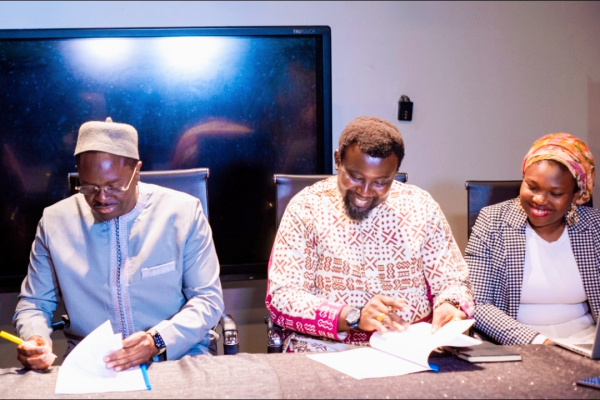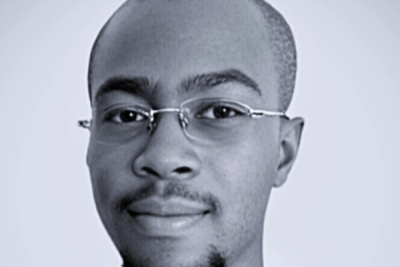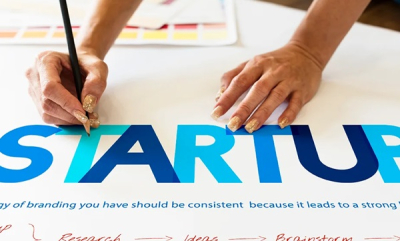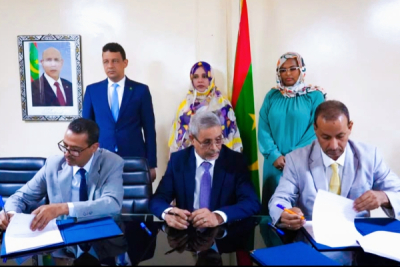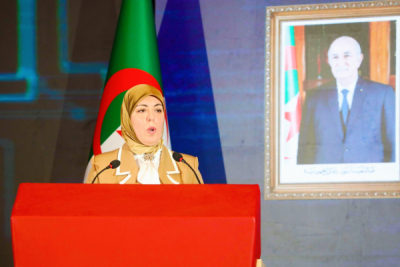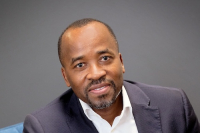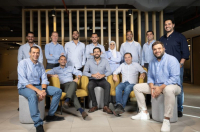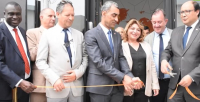As digital technology reshapes everyday life, new initiatives are emerging to meet people's daily needs. Fueled by an innovative vision, one entrepreneur is steadily becoming a key player in this transformation.
Vianney Kanda (photo), a Central African expert in corporate finance and a technology entrepreneur, is the founder and chief executive officer of Warani, a startup specializing in the development of digital solutions.
Founded in 2022, Warani designs digital tools across various sectors. A key achievement is Warani Food, a mobile application for ordering and delivering meals to homes. This platform allows restaurant owners to present their menus to customers, who can track the delivery person's real-time location once their order is confirmed.
Another innovation from Warani is Warani Shop, a go-to platform for online shopping and rapid product delivery. The company also operates in the real estate sector with the Wara application, which assists users in buying property, making it profitable, or building their homes. Additionally, Warani Hébergement enables users to book accommodations, including hotels, villas, and trips within the Central African Republic.
"The idea behind Warani is not just to promote services to Central Africans but also to make traditionally sold products more accessible and to offer so-called digital solutions, with the aim of contributing to the economic structure. That’s why we decided to launch this startup," explained Vianney Kanda, Warani's founder.
In terms of his education, Vianney Kanda earned a bachelor's degree in finance and financial services management from the Université Centrale de Tunisie in 2015. He subsequently obtained a master's degree in wealth management, finance, and financial services from MBA ESG in Paris in 2018, followed by a master's degree in corporate finance, mergers, and acquisitions from the same institution in 2021.
His professional career began in Spain in 2017 at the Borja Center, a Jesuit community, where he served as a financial management officer. Between 2019 and 2021, he held the position of financial analysis and reporting manager at Optima Finances, a company based in France.
By Melchior Koba,
Editing by Sèna D. B. de Sodji
- The Senegalese Data Protection Commission (CDP) partnered with the Pan-African NGO Paradigm Initiative (PIN) to enhance digital education, privacy protection, and awareness in Africa.
- The collaboration will involve joint awareness campaigns, capacity-building workshops, and training for public institutions, private sector actors, and civil society.
- The partnership addresses challenges in Senegal's data protection culture and aligns with regional efforts to improve digital rights and security.
Senegal's Commission for the Protection of Personal Data (CDP) announced Monday a strategic memorandum of understanding with the Pan-African non-governmental organization Paradigm Initiative (PIN), on the sidelines of the African Network of Personal Data Protection Authorities (RAPDP) General Assembly in Abuja. The partnership aims to strengthen awareness, digital education, and privacy protection amid the continent's rapid digital transformation.
"The government, the private sector, civil society, and the media must collaborate so that we can make the most of the digital economy. We cannot continue to talk about the digital economy without protecting it," said Gbenga Sesan (photo, center), the executive director of the NGO.
The collaboration will involve joint awareness campaigns, including information drives, capacity-building workshops, and training sessions targeting public institutions, the private sector, and civil society. The overarching goal is to embed a culture of data protection at both the national and sub-regional levels.
PIN, which operates in six African nations – Cameroon, Nigeria, Kenya, Senegal, Zambia, and Zimbabwe – brings its expertise in advocating for digital rights to this partnership. The NGO also operates an online platform where individuals can report instances of abuse or unauthorized use of their personal data.
In Senegal, this collaboration coincides with the increasing digitization of public and private services, a trend supported by national policies aimed at leveraging digital technology for development. However, a robust data protection culture has yet to fully develop. While Law No. 2008-12 on personal data provides a legal framework, its full implementation is hindered by a lack of technical resources, training, and awareness within institutions and among the general public. Despite its active role, the CDP faces challenges in addressing all issues arising from the proliferation of digital platforms and the massive collection of data.
Across the African continent, the state of data protection is varied. According to the 2025 Yellow Card report, 39 of the 55 African countries now have personal data protection legislation in place. However, the enforcement of these laws differs significantly. While some nations, such as Morocco, South Africa, and Kenya, have active and well-structured regulatory authorities, others lack the necessary human and financial resources or independence, limiting their capacity to act effectively. Furthermore, the ratification of the Malabo Convention on cybersecurity and data protection, which entered into force in 2023, represents notable progress, although its implementation remains inconsistent.
Given these shared challenges, regional collaborations, such as the partnership between the Senegalese CDP and Paradigm Initiative, are seen as crucial for pooling resources, harmonizing practices, and fostering a digital environment that is safe, inclusive, and respectful of rights.
By Samira Njoya,
Editing by Sèna D. B. de Sodji
He is among the African entrepreneurs of his generation who leverage technology to solve real-world problems. With an inclusive approach, he is using innovation to improve education.
Blaise-Antoine Lauboue (photo), an Ivorian entrepreneur with a focus on technology and digital transformation, is the founder, chief executive officer, and chief operating officer of Le Badjôr, a startup centered on educational technologies.
Established in 2024, Le Badjôr has developed an application designed to make collaborative and engaging learning accessible to all. The company's mission is to cultivate a stimulating environment where students can review material daily throughout their academic careers, whether in school or university. A key feature of the application, "Mon Gbonhi," enables users to form communities for knowledge sharing.
The application uses a question-and-answer system enhanced by a voting mechanism, fostering more dynamic and interactive exchanges. It also incorporates a points and virtual currency system, allowing users to unlock resources such as exam topics, assignments, or quizzes to improve their preparation. A complimentary instant messaging feature is integrated to promote inclusion and peer support among students and other learners.
Lauboue holds certifications in user interface/user experience (UI/UX) design and graphic design, training he completed in 2023 at Simplon Côte d’Ivoire. His professional journey began in 2020 at Tootree, another educational technology company, where he served as general manager.
In 2023, he joined Mstudio as a UI/UX designer while concurrently holding the position of UI/UX manager at Edopay Côte d’Ivoire, a local financial technology firm. In 2024, Lauboue first worked as an art director at Image Réputation et Influence, a company specializing in image management, public affairs, and influence strategy, and subsequently as a design manager at Spider Technologies.
By Melchior Koba,
Editing by Sèna D. B. de Sodji
From December 2 to 12, 2024, the Beninese Ministry of Digitalization launched a call for applications for Beninese MSMEs wishing to obtain the "startup label." The results were recently announced.
Beninese authorities on Friday announced the 15 micro, small, and medium-sized enterprises (MSMEs) awarded the "start-up label" for the next three years. These companies were selected from a pool of 95 applicants operating in sectors including health, tourism, and technology.
"After verifying the eligibility and completeness of the applications by the permanent secretariat of the technical labeling committee, twenty (20) applications were shortlisted and subjected to an evaluation process conducted by the committee [...]. At the end of the evaluation process, fifteen (15) micro, small, and medium-sized enterprises were granted the start-up label for the next three (03) years," stated the Beninese Ministry of Digitalization.
This selection follows a call for applications that ran from December 2 to 12, 2024, for Beninese MSMEs seeking the "startup label." The awarding of this label is part of the implementation of Decree No. 2023-095 dated March 22, 2023. Authorities intend to provide specific support to these labeled companies to encourage their growth in a favorable environment.
Under Benin's current general tax code, these labeled companies "benefit from a corporate tax exemption and exemption from employer salary contributions for the first two (2) years of activity, as well as a 50% reduction on the same taxes for the third year." The aim is to stimulate innovation, create jobs, and encourage investment in Beninese start-ups.
According to Briter Bridge's "Africa 2023 Investment Report Crisis or Adjustment," African start-ups attracted over $22 billion between 2013 and 2023. In 2024, they secured $3.2 billion, according to Partech Africa data. In the medium term, the "start-up label" initiative could foster the development of a competitive pool of start-ups at the regional and continental levels, while enhancing Benin's attractiveness as an innovation hub in West Africa. Senegal, Rwanda, and Tunisia have previously implemented similar measures to bolster their start-up ecosystems.
Adoni Conrad Quenum
- The platform will provide ongoing professional development for primary school teachers, accessible for free through all ISPs.
- The initiative includes setting up 63 computer labs, each with a server, to ensure platform access even without a direct internet connection.
- Trainers and technicians will be trained to manage and develop platform content, supporting the long-term sustainability of the initiative.
The Mauritanian government is set to launch a digital platform for the ongoing professional development of primary school teachers. A cooperation agreement to establish the platform was signed on Monday between the Ministry of Digital Transformation and Administrative Modernization and the Ministry of Education and Educational System Reform.
The digital platform will be offered free of charge to all teachers and accessible through all internet service providers in Mauritania. Plans also include the creation of 63 computer labs, one in each department. Each lab will be equipped with a server to provide platform access without requiring a direct internet connection.
"The agreement also encompasses a training program for trainers and technicians from the education ministry to enable them to manage the platform and develop its content, thereby ensuring its sustainability and effectiveness," the Ministry of Digital Transformation stated.
The implementation of this platform is part of the Mauritanian government's broader efforts to digitize the national education system. Earlier this year, education sector stakeholders began developing a roadmap for the digital transformation of the sector. Authorities are also working on a novel system to digitize diplomas, aiming to modernize their issuance and enhance their verification.
The Mauritanian government's focus on strengthening teachers' skills through the digital platform is intended to improve teaching quality and student outcomes. However, stakeholders have not yet announced a timeline for the platform's design or deployment. Furthermore, the issue of effective teacher adoption remains to be addressed. Beyond the planned computer labs, the system's success will also depend on individual teachers' access to digital devices like smartphones or computers.
By Isaac K. Kassouwi,
Editing by Sèna D. B. de Sodji
- The strategy aims to fully digitize Algeria by 2030, fostering collaboration among government, tech experts, and the private sector, with strong support from the presidency.
- Priorities include training 500,000 ICT specialists, reducing tech talent emigration by 40%, and boosting the digital sector’s GDP contribution to 20%.
High Commissioner for Digitalization Meriem Benmouloud unveiled Algeria's National Digital Transformation Strategy (SNTN) on Monday, a blueprint aiming to fully digitize the nation by 2030. The strategy seeks to galvanize all stakeholders – from government ministries and tech experts to public and private sector players – around a shared vision for the future.
Benmouloud emphasized the strong presidential backing for this initiative, stating, "The significant importance the President of the Republic places on digitization, personally monitoring its progress, underscores the unwavering political will at the highest levels to achieve a comprehensive digital transition in Algeria."
The SNTN is built upon five foundational pillars: the development of robust digital infrastructure, the cultivation of digital skills and training, the establishment of effective digital governance, the promotion of a thriving digital economy, and the inclusive integration of all citizens into the digital realm.
Central to the strategy is the development of human capital. The government aims to train 500,000 information and communication technology (ICT) specialists while simultaneously working to decrease the emigration of these skilled workers by 40%.
Economically, the SNTN envisions digitalization as a key engine of growth, targeting a 20% contribution from the digital sector to Algeria's gross domestic product. This will be achieved by digitizing public services and nurturing a dynamic environment for tech entrepreneurship.
Furthermore, a top priority is the complete digitization of government administration, a move expected to streamline processes, enhance transparency, and improve the quality of services delivered to both citizens and businesses.
Underpinning these ambitions are significant infrastructure projects, including two national data centers. The facility in Mohammadia is reportedly 80% complete, while the Blida center is 50% finished, according to the High Commissioner. These strategic assets are designed to bolster Algeria's national capacity for secure data storage, processing, and the hosting of digital platforms.
Supporting the entire strategy are two critical cross-cutting elements: first, the creation of a suitable legal and regulatory framework, with a draft law on digitization currently under development; and second, the strengthening of cybersecurity defenses, deemed essential for protecting data and information systems against increasingly sophisticated cyber threats.
Through the SNTN, Algeria envisions itself emerging as a leading digital hub in North Africa. Benmouloud asserted that the progress made to date positions the country to achieve continental leadership in digital transformation by the target year of 2030.
This strategic roadmap aims to provide a sustainable structure for government action in the digital sphere, with a clear focus on inclusive development, technological sovereignty, and the modernization of the Algerian economy.
By Samira Njoya,
Editing by Sèna D. B. de Sodji
AI fairness and inclusivity depend on diverse datasets. With Zindi crowdsourcing local data challenges and Cassava powering the infrastructure, the continent is poised to create context-aware AI tools.
Cassava Technologies, a pan-African technology provider, has signed a Memorandum of Understanding (MoU) with Zindi, a professional network for data scientists. The MoU, announced May 12, aims to accelerate the adoption of artificial intelligence (AI) and Graphics Procesing Unit (GPU)-as-a-Service (GPUaaS) solutions across Africa.
“For Africa’s AI ecosystem to grow and thrive, it’s essential to provide platforms and resources,” said Hardy Pemhiwa, President and Group CEO of Cassava Technologies. “Combining our data centres’ advanced GPU capabilities with Zindi’s innovative data science platform creates a powerful foundation for digital advancement.”
The partnership aims to empower African developers and startups with the tools and infrastructure needed to build scalable AI solutions. Through this collaboration, Zindi will leverage Cassava’s GPUaaS infrastructure to enhance its AI model development, while both organizations will explore opportunities to cross-integrate platforms and expand access to talent, data, and innovation.
Zindi, known for organizing AI challenges in partnership with companies, NGOs, and governments, sees the partnership as a catalyst for unlocking locally-relevant AI solutions.
“Zindi is thrilled at the opportunity to partner with Cassava Technologies to strengthen African datasets, address local problems with locally-developed solutions, and help more African AI builders access the resources they need to succeed,” said Celina Lee, CEO and Co-Founder of Zindi.
As digital transformation accelerates across Sub-Saharan Africa, artificial intelligence is emerging as a key driver of economic opportunity. The United Nations projects that AI could contribute up to $1.5 trillion to the region’s economy by 2030, a figure that underscores the urgency of building the infrastructure, talent pipelines, and innovation ecosystems needed to capture this potential.
The Cassava–Zindi partnership is a timely response to this opportunity. By combining Cassava’s GPU-as-a-Service capabilities with Zindi’s pan-African network of data scientists, the collaboration directly supports scalable, locally driven AI development, a critical step toward unlocking the region’s projected AI-driven growth.
This announcement follows Cassava’s 2024 launch of its AI business and its bold plans to build Africa’s first AI factory. The Zindi partnership supports Cassava’s broader vision of fostering responsible AI innovation and digital transformation across the continent.
Hikmatu Bilali
Nawy, an Egyptian proptech platform, has raised $75 million to fuel its regional expansion, scale operations, and enhance its technology stack. The funding, announced May 12, includes $52 million in Series A equity, led by Partech, and $23 million in debt from top Egyptian banks to support its fast-growing mortgage business.
The Series A attracted leading global and regional investors, including e& Capital, Verod-Kepple, MCI, VentureSouq, Endeavor Catalyst, DPI’s Nclude Fund, Shorooq Partners, and Plug and Play.
The new funds will power Nawy’s market expansion, AI product development, and mortgage vertical growth, positioning it to lead regional real estate innovation.
The Global AgriInno Challenge 2025, organized by the Food and Agriculture Organization (FAO) and Zhejiang University (ZJU), is accepting applications from young innovators and agritech entrepreneurs developing digital solutions for sustainable agrifood systems. Finalists will pitch their innovations at the FAO Science and Innovation Forum in Rome this October.
The challenge seeks innovations addressing climate resilience, supply chain efficiency, and nutritional security. Participants will benefit from a 48-hour co-creation bootcamp with global mentors, expert coaching from UN agencies, investors, and private sector leaders, and access to the Global AgriInno Challenge alumni network.
Winning teams will receive up to $30,000 in seed funding and full sponsorship, including travel, visa, accommodation, and meals, to attend the final event in China. The deadline to submit an expression of interest is 7 June 2025.
- Orange Tunisia inaugurated a TIER III data center in Kalâa Kebira, Sousse, to enhance local data hosting and support the country's digital transition.
- Covering 1,000 m², the center offers cloud hosting, backup, disaster recovery, and connectivity, designed entirely from scratch with Tunisian expertise.
Orange Tunisia last week unveiled a new, advanced data center in Kalâa Kebira, Sousse governorate, local media reported. The TIER III certified facility aligns with the operator's strategy to bolster Tunisia's digital transformation by increasing domestic data hosting capabilities.
The 1,000 square meter data center is built to international standards for security, energy redundancy, and service continuity. It will offer cloud hosting, backup, disaster recovery, and connectivity services, catering to both Orange Tunisia's internal operations and businesses seeking secure outsourcing for their information systems management.
"We are particularly proud of this data center for several reasons. Firstly, it was designed and built entirely from the ground up. This isn't a renovation or adaptation of an existing site, but a completely new project conceived from the start to meet the most stringent standards," stated Thierry Millet, CEO of Orange Tunisia. The company holds a 26.5% share of Tunisia's mobile telephony market as of January 2025, according to the National Telecommunications Authority.
This development occurs amidst an accelerating digital transformation within Tunisia. Orange Tunisia aims to support this momentum and contribute to enhanced digital sovereignty. "Our pride lies in having executed this impressive TIER III data center with 100% Tunisian talent, utilizing Tunisian companies for design, control, and implementation," said Adel Akrout, the company's network and services director.
With the demand for digital services rapidly increasing, this initiative could position Tunisia as a key regional data hub. It also sets the stage for future sovereign cloud endeavors and strengthens the role of operators in the country's digital advancement.
Adoni Conrad Quenum
More...
The intersection of technology, social innovation, and entrepreneurship is producing new leaders who are tackling today's global challenges. Some are making a significant impact by developing practical solutions for communities.
Togolese computer scientist and tech entrepreneur Kokou Nouvor co-founded Fintou, a startup platform designed to help cultural figures, organizations, and companies fund and execute their projects through crowdfunding.
Established in 2022, Fintou specializes in financial technology, offering innovative solutions to streamline digital project management, including fundraising, ticketing, sales, and communication. Its "Fintou Me" feature allows users to easily receive payments via a unique link or QR code, eliminating the need for a website.
Fintou also facilitates the launch of participatory campaigns with clearly defined goals and incentives to effectively engage donors. The platform enables users to create customizable donation pages that can be seamlessly integrated into websites or applications. Additionally, it simplifies the organization of online events and rapid ticket sales.
Users can also create simple and secure voting systems, both free and paid, to involve their community in collective decision-making. Furthermore, Fintou supports the sale of physical or digital products, providing a QR code for easier distribution and increased sales. Finally, the platform offers the option to build an online showcase to present projects, teams, and values, enhancing audience engagement.
Beyond his entrepreneurial ventures, Nouvor trains children in coding at Nehemiah Lab, an entrepreneurship-focused center. Prior to co-founding Fintou, he launched DobbeePay in 2019, a Togolese online payment and money transfer solution enabling interoperability between various payment methods like Mobile Money, cryptocurrencies, and bank transfers.
Nouvor earned a bachelor's degree in law from the University of Lomé in 2017. In 2024, he obtained a professional diploma in software engineering from the European Open University.
His professional journey began in 2019 as a freelance web developer. In 2022, he joined Airline Profits, an aviation magazine, as a developer and graphic designer. The following year, he became a software engineer and digital project manager at Éditions SYDO, a publishing house involved in book releases and cultural events.
Concurrently, he served as technical director at Gurvio Labs, a digital transformation company. In 2023, he also worked as a software developer and digital transformation advisor for the non-profit association 5D'S, which focuses on youth growth and empowerment.
By Melchior Koba,
Editing by Sèna D. B. de Sodji
African freelancers frequently face persistent challenges in receiving payments. To tackle this problem, Benaiah Wepundi has created a financial platform to provide quick access to their funds.
Kenyan software engineer and tech entrepreneur Benaiah Wepundi founded Payd, a financial platform launched in 2022 aimed at streamlining international payments for freelancers, creatives, and digital workers in emerging markets.
Payd's goal is to simplify how these professionals receive payments globally, spend locally, and access financial services such as savings, credit, and management tools. The platform allows users to generate personalized payment pages, payment links, and QR codes, as well as issue invoices and receipts.
"We asked ourselves: Why should independent workers — the backbone of the modern economy — be penalized for their global reach? This question ignited our passion to build Payd," Wepundi said.
To date, Payd has helped reduce delays, costs, and stress associated with international money transfers. The platform has garnered over 18,000 users across 15 countries, processed more than $500,000, and recorded over 45,000 transactions.
Prior to launching Payd, Wepundi established EasyHouse Africa in 2021, a Kenyan-based tech company focused on simplifying property rentals. He earned a software engineering degree in 2023 from Moringa School, a learning accelerator, and is currently pursuing law studies at the Catholic University of Eastern Africa.
Between 2023 and 2024, Wepundi served as Chief Operating Officer at Cyphon AI, a U.S.-based tech firm. Concurrently, he also worked for Precision Consulting, an American research firm, where he held roles as a software engineer, business development manager, and ultimately, chief technology officer.
By Melchior Koba,
Editing by Sèna D. B. de Sodji
Innovate Africa, a product-focused venture fund, will host World Product Day Lagos 2025 on Wednesday, May 21, at The Strong Tower Hall, Lagos.
Part of the global Mind the Product initiative celebrated in 100+ cities, the event will bring together product builders, engineers, founders, and tech teams for expert talks, workshops, and a live pitch showcase.
Under the theme “Bold Builders Wanted,” the event follows a continent-wide innovation sprint that began in March with an open Ideathon. Innovate Africa selected 12 major challenges across health, climate, governance, and infrastructure, guiding teams through product sprints to prototype stage. The top five teams will pitch live for a $2,000 prize and post-event support, including potential incubation and mentorship.
- Bolt ends services in Tunisia on May 9, following government actions related to money laundering, tax fraud, and illegal operations.
- Shutdown impacts over 5,000 independent drivers, sparking debate on Tunisia's legal framework for digital platforms amid high unemployment.
Estonian ride-hailing application Bolt ceased operations in Tunisia on Friday, May 9, with a complete deactivation of the app confirmed on local devices. Since that date, the application is inaccessible, displaying the message "Bolt is not yet available here" to Tunisian users.
This shutdown follows nearly six weeks after the government's decision on March 24 to suspend several transport platforms, including Bolt, amid suspicions of money laundering, tax evasion, and illegal operation. Despite the announced suspension, the application had remained partially active, creating legal ambiguity regarding its status. This deactivation marks the effective end of Bolt's activity in the country, although the company has not yet publicly stated the specific reasons for its withdrawal.
Tunisian authorities had previously initiated stringent measures against platforms operating without legal authorization. In Bolt's case, the company was removed from the national business register, its offices were closed, and assets estimated at 12 million Tunisian dinars (approximately $3.9 million) were seized. Bolt, for its part, had denied the accusations, asserting its compliance with Tunisian law while criticizing a process conducted without due legal recourse.
Bolt, which entered Tunisia in 2019, had rapidly become a significant player in urban transportation, particularly in Tunis, Sfax, and Sousse. The application provided income for over 5,000 drivers, many of whom were independent contractors, in a challenging socio-economic environment. Its suspension heightens uncertainty for these workers, especially given that the national unemployment rate had already reached 16% in the third quarter of 2024, according to the National Institute of Statistics.
Bolt's departure has reignited discussions about the legal framework for digital platforms in Tunisia. The absence of clear regulations leaves companies operating in a precarious gray area, susceptible to administrative actions and regulatory shifts. To fully leverage the digital economy and attract foreign investment, Tunisia will need to strike a balance between regulatory oversight and economic appeal.
By Samira Njoya,
Editing by Sèna D. B. de Sodji



